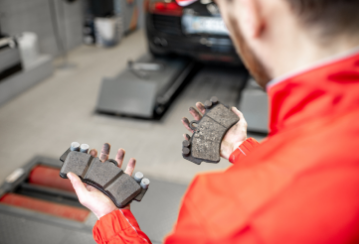News and Updates
How brake dust from your vehicle can impact your health
Everyone knows that gasoline powered vehicles give off carbon emissions, but did you know that they also emit brake dust? Even a fully electric vehicle can give off brake dust and contribute to car pollution. Read on to learn more about the impacts of brake dust on your health and what you can do to prevent harmful effects.
What is brake dust?
Every time you use your brakes, metal particles produced by the rubbing of your brake pads against your wheel are emitted. These small particles are harmful both to the environment and your health. Brake dust contributes 20% of fine particulate matter pollution, compared to just 7% contributed by exhaust fumes.1 As all cars give off brake dust, there is no such thing as a truly zero-emission vehicle.
How does brake dust impact my health?
When these tiny metal particles are emitted into the air, we breath them into our lungs. When these particles react with sulphate rich particles in the air, they create a toxic aerosol. This aerosol can damage our lungs and create respiratory problems.2 In the UK, the term “London Throat,” is used when a person experiences a froggy throat and chronic cough caused by brake dust pollution.3 More seriously, additional impacts include contributing to pneumonia and bronchitis and destroying white blood cells, a critical part of the immune system.
How can I prevent brake dust pollution?
1. Replace worn out brake pads
 When brake pads are worn out, they create more brake dust pollution. Be diligent about replacing them according to your owner’s manual – typically brake pads need to be replaced after about 50,000 miles. Best practice is to ask your mechanic to inspect your brake pads each time you get an oil change and pay attention to any squealing or other unusual noises coming from your brakes.4
When brake pads are worn out, they create more brake dust pollution. Be diligent about replacing them according to your owner’s manual – typically brake pads need to be replaced after about 50,000 miles. Best practice is to ask your mechanic to inspect your brake pads each time you get an oil change and pay attention to any squealing or other unusual noises coming from your brakes.4
2. Service your brake calipers
If your brake calipers or caliper sliders are sticking, your brakes will create more dust than normal. Brake calipers should generally be serviced every two years or 38,000 km.5
3. Choose ceramic brake pads instead of semi-metallic
Ceramic brake pads generally create less brake dust compared to semi-metallic and the brake dust they do create is less toxic.6
With these steps, you can help be a part of reducing the brake dust in your environment.
Another aspect of looking after your health and safety is also ensuring that you have the right car insurance coverage you need in an emergency. If you want to get a quote for auto insurance, call an OTIP insurance broker at 1-866-561-5559. If you have a question about your car insurance coverage, please call 1-800-267-6847.
1. US News
2. Science Daily
3. BBC
4. Your Mechanic
5. Crestmont Cadillac
6. Car Parts







